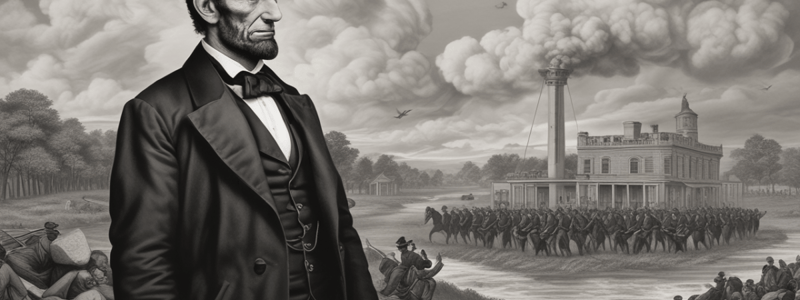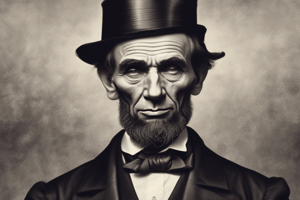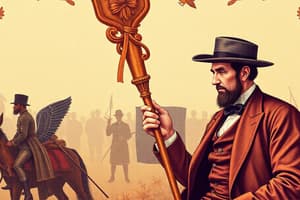Podcast
Questions and Answers
Which states and parts of states are mentioned as being affected by the proclamation?
Which states and parts of states are mentioned as being affected by the proclamation?
- Only Southern states
- Only border states
- All states except West Virginia and some counties (correct)
- All states in the United States
What was the approximate number of Union soldiers who died during the Civil War?
What was the approximate number of Union soldiers who died during the Civil War?
- 500,000
- 200,000
- 400,000
- 359,000 (correct)
What is the purpose of the Emancipation Proclamation?
What is the purpose of the Emancipation Proclamation?
- To abolish slavery in the entire United States
- To free slaves in specific states and parts of states (correct)
- To punish Confederate states
- To end the Civil War immediately
When did Abraham Lincoln deliver the Gettysburg Address?
When did Abraham Lincoln deliver the Gettysburg Address?
What is instructed to the people declared to be free?
What is instructed to the people declared to be free?
What was the main purpose of the Emancipation Proclamation?
What was the main purpose of the Emancipation Proclamation?
What is recommended to the people declared to be free?
What is recommended to the people declared to be free?
What was the time period of the Civil War?
What was the time period of the Civil War?
What opportunity is offered to people of suitable condition?
What opportunity is offered to people of suitable condition?
Approximately how many Confederate soldiers died during the Civil War?
Approximately how many Confederate soldiers died during the Civil War?
On what grounds does the President invoke the considerate judgment of mankind?
On what grounds does the President invoke the considerate judgment of mankind?
What was the date set by the Emancipation Proclamation for the freedom of slaves?
What was the date set by the Emancipation Proclamation for the freedom of slaves?
When did the Civil War end and who was assassinated?
When did the Civil War end and who was assassinated?
Who assassinated Abraham Lincoln?
Who assassinated Abraham Lincoln?
What is the purpose of the proclamation mentioned in the text?
What is the purpose of the proclamation mentioned in the text?
What is the requirement for a State to be deemed not in rebellion?
What is the requirement for a State to be deemed not in rebellion?
Who is issuing the proclamation?
Who is issuing the proclamation?
What is the duration of the proclamation?
What is the duration of the proclamation?
What is the authority by which the proclamation is issued?
What is the authority by which the proclamation is issued?
Which of the following is NOT a state in rebellion?
Which of the following is NOT a state in rebellion?
What is the purpose of counting the number of qualified voters participating in elections?
What is the purpose of counting the number of qualified voters participating in elections?
What is the consequence of a State being deemed in rebellion?
What is the consequence of a State being deemed in rebellion?
What was the period after the Civil War known as?
What was the period after the Civil War known as?
What was the purpose of the 'Black Codes' enacted by some southern states after the Civil War?
What was the purpose of the 'Black Codes' enacted by some southern states after the Civil War?
What was one of the rights denied to African Americans during the Reconstruction period?
What was one of the rights denied to African Americans during the Reconstruction period?
What was the consequence of 'disobedience' according to the Louisiana Code?
What was the consequence of 'disobedience' according to the Louisiana Code?
Who was the President of the United States during the Reconstruction period?
Who was the President of the United States during the Reconstruction period?
What was the Freedmen's Bureau bill aimed at?
What was the Freedmen's Bureau bill aimed at?
What did President Andrew Johnson do to the Freedmen's Bureau bill and the Civil Rights bill?
What did President Andrew Johnson do to the Freedmen's Bureau bill and the Civil Rights bill?
Who controlled Congress during the Reconstruction period?
Who controlled Congress during the Reconstruction period?
What was the irony of the USA's situation during WWII?
What was the irony of the USA's situation during WWII?
What facilities were denied to black American soldiers during WWII?
What facilities were denied to black American soldiers during WWII?
What was the result of wartime service and mobility for black Americans?
What was the result of wartime service and mobility for black Americans?
Who was responsible for discrediting the USA in the developing world during the 1950s?
Who was responsible for discrediting the USA in the developing world during the 1950s?
What was the goal of Thurgood Marshall's 'free by 63' campaign?
What was the goal of Thurgood Marshall's 'free by 63' campaign?
What was the significance of the 1954 court case?
What was the significance of the 1954 court case?
What was the 'Brandeis brief' used for in the Brown v. Board of Education case?
What was the 'Brandeis brief' used for in the Brown v. Board of Education case?
What was the significant change in the Supreme Court during the 1950s?
What was the significant change in the Supreme Court during the 1950s?
Flashcards are hidden until you start studying
Study Notes
The Civil War (1861-1865)
- The bloodiest war in the USA, with more victims than all other wars combined (approximately 359,000 Union soldiers and 258,000 Confederates)
- Abraham Lincoln addressed the issue of slavery on two famous occasions:
- Emancipation Proclamation of September 22, 1862
- Gettysburg Address on November 19, 1863
- The Emancipation Proclamation declared that all persons held as slaves in states or parts of states in rebellion against the United States would be free from January 1, 1863
- The proclamation did not apply to areas under Union control, such as parts of Louisiana, Virginia, and West Virginia
After the Civil War (1865-1954)
Reconstruction (1865-1877)
- The period of "Reconstruction" aimed to bring together the American nation after years of brutal conflict
- African Americans still faced significant challenges, including:
- "Black Codes" enacted by southern states to deny them basic civil rights and liberties
- Restrictions on their freedom, such as the inability to strike or leave employment
- Wandering African Americans could be arrested and fined for vagrancy
Presidential Inaction
- President Andrew Johnson, a former slave owner, did not prevent the abuse of African Americans, believing that states had the right to act as they saw fit
- He vetoed the Freedmen's Bureau bill and the Civil Rights bill, which aimed to protect African Americans
Social Change
- During World War II, the USA was fighting a racist regime in Germany while perpetuating racism at home
- Black Americans did not have basic rights, and Nazi war prisoners enjoyed better facilities and treatment than black American soldiers
Political Change
- The antics of Senator Joseph McCarthy damaged the US image abroad, leading to a loss of soft power in the 1950s
- Racist policies were used to discredit the USA in the developing world
Legal Change
- The National Association for the Advancement of Colored People (NAACP) was a grassroots civil rights organization founded in 1909
- Thurgood Marshall, head of the NAACP's Legal Defense Fund, set a deadline to end segregation by 1963 (the 100th anniversary of the Emancipation Proclamation)
- The NAACP worked for change, and President Eisenhower's appointment of Justice Earl Warren led to significant changes in the Supreme Court's decisions
- The Plessy v. Ferguson case was overruled in 1954, paving the way for desegregation
Studying That Suits You
Use AI to generate personalized quizzes and flashcards to suit your learning preferences.




